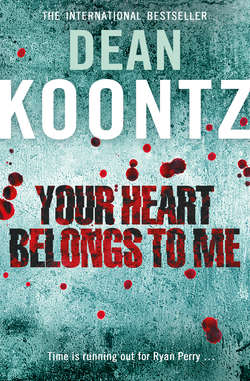Читать книгу Your Heart Belongs to Me - Dean Koontz - Страница 15
ОглавлениеNINE
The moon was down, the sky still dark that Friday morning when Ryan set out for the hospital. The urban glow obscured many stars, but to the west, the sea and shore were one and black and vast.
In spite of the fact that he might have a seizure while behind the wheel, he risked driving. He preferred that Lee Ting not know he was undergoing a myocardial biopsy.
He told himself that he didn’t want people who worked for him or who were otherwise close to him to worry. But in fact he did not want to give an enemy, if one existed, the satisfaction—and advantage—of knowing that he was weakened and vulnerable.
As he walked alone through the hospital parking garage, where the sorcerous-sour yellow light polished the carapaces of the cars into iridescent beetle shells, he had the eerie feeling that he was home and sleeping, that this place and the test to come were all moments of a dream within a dream.
From the out-patient admitting desk, an orderly showed him the way to the cardiac diagnostics laboratory.
The head cardiology nurse, Kyra Whipset, could not have been more lean if she had eaten nothing whatsoever but celery and had run half a marathon every day. She had so little body fat that even in high-buoyancy saltwater, she would sink like a dropped anchor.
After ascertaining that Ryan had eaten nothing after midnight, Nurse Whipset provided a sedative and water in a small paper cup.
“This won’t put you to sleep,” she said. “It’ll just relax you.”
A second nurse, Ismay Clemm—an older, pleasantly plump black woman—had green eyes in which the striations were like the bevels in a pair of intricately cut emeralds. Those eyes would have been striking in any face; they were especially arresting because of the contrast with her smooth dark skin.
While Nurse Whipset sat at a corner desk to make an entry in Ryan’s file, Ismay watched him take the sedative. “You okay, child?”
“Not really,” he said, crushing the empty paper cup in his fist.
“This is nothin’,” she assured him as he dropped the cup in a waste can. “I’m here. I’m watchin’ over you. You’ll be just fine.”
By contrast with Nurse Whipset’s ascetic tautness, Ismay’s abundance, which included a musical voice that conveyed caring as effortlessly as it would a tune, comforted Ryan.
“Well, you are taking three pieces of my heart,” he said.
“Tiny pieces, honey. I suspect you’ve taken far bigger pieces from the tender hearts of a few sweet girls. And they’re all still livin’, aren’t they?”
In an adjacent prep room, he stripped to his undershorts, stepped into a pair of disposable slippers, and wrapped himself in a thin, pale-green, collarless robe with short sleeves.
Back in the diagnostics laboratory, Dr. Gupta had arrived, as had the radiologist.
The examination table was more comfortable than Ryan expected. Samar Gupta explained that comfort was necessary because during this procedure, a patient must lie on his back, very still, for at least an hour, in some cases perhaps for two hours or more.
Suspended over the table, a fluoroscope would instantly project moving x-ray images on a fluorescent screen.
As the cardiologist, assisted by Nurse Whipset, prepared for the procedure, Ismay Clemm monitored Ryan’s pulse. “You’re doing fine, child.”
The sedative began to take effect, and he felt calmer, although wide awake.
Kyra Whipset scrubbed Ryan’s neck and painted a portion of it with iodine.
After applying a topical anesthetic to steal the sting from the needle, Dr. Gupta administered a local anesthetic by injection to the same area.
Soon Ryan could feel nothing when the physician tested the nerve response in his neck.
He closed his eyes while something with an astringent smell was swabbed on his numb flesh.
Describing his actions aloud, Dr. Gupta made a small incision in Ryan’s jugular vein and introduced a thin, highly flexible catheter.
Ryan opened his eyes and watched the fluoroscope as it followed the tedious progress of the catheter, which the cardiologist threaded carefully into his heart, guided by the image on the screen.
He wondered what would happen if in the midst of this procedure he suffered a seizure as he had on the surfboard, his heart abruptly hammering two or three hundred beats a minute. He decided not to ask.
“How are you doing?” Dr. Gupta inquired.
“Fine. I don’t feel anything.”
“Just relax. We’re making excellent progress.”
Ryan realized that Ismay Clemm was quietly reporting on his heart rhythm, which evidently had become slightly unstable upon the introduction of the catheter.
Maybe this was normal, maybe not, but the instability passed.
And the beat goes on.
Once the primary catheter was in place, Dr. Gupta inserted into it a second catheter, a bioptome, with tiny jaws at its tip.
Ryan had lost all sense of time. He might have been on the table a few minutes or an hour.
His legs ached. In spite of the sedative, the muscles in his calves were tense. His right hand had tightened into a fist; he opened it, as if hoping to receive another’s hand, a gift.
Long he lay there, wondering, fearing.
The jaws of the bioptome bit.
Inhaling with a hiss through clenched teeth, Ryan didn’t think that he imagined the quick painful pinch, but perhaps he was reacting to the brief frantic stutter of his heart on the fluorescent screen.
Dr. Gupta retrieved the first sample of Ryan’s cardiac muscle.
Nurse Clemm said, “Don’t hold your breath, honey.”
Exhaling, Ryan realized that he expected to die during the procedure.
